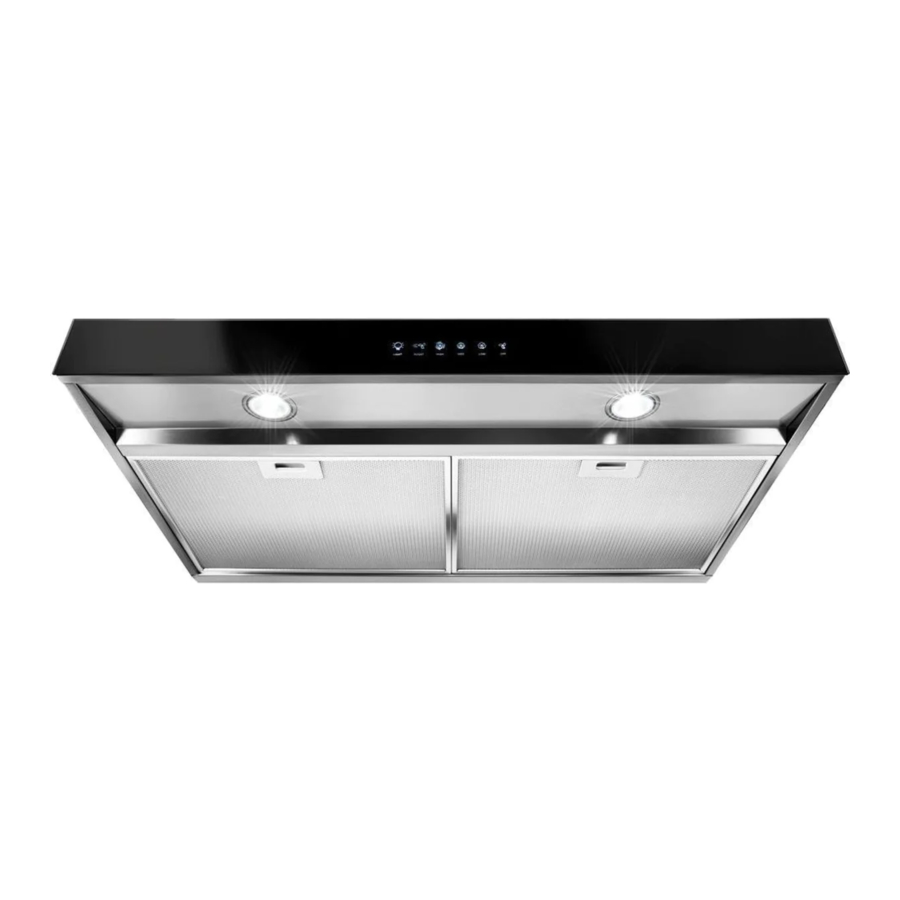Whirlpool WVU57UC0F 설치 지침 및 사용 및 관리 매뉴얼 - 페이지 6
{카테고리_이름} Whirlpool WVU57UC0F에 대한 설치 지침 및 사용 및 관리 매뉴얼을 온라인으로 검색하거나 PDF를 다운로드하세요. Whirlpool WVU57UC0F 36 페이지. 30" (76.2 cm) and 36" (91.4 cm) range hood
Whirlpool WVU57UC0F에 대해서도 마찬가지입니다: 설치 지침 및 사용 및 관리 매뉴얼 (36 페이지), 설치 지침 및 사용 및 관리 매뉴얼 (19 페이지)

Installation Clearances
B
A
E
A. 18" (45.7 cm) min. clearance - upper cabinet to countertop
B. 24" (61.0 cm) minimum - bottom of range hood to cooking surface
C. 30" (76.2 cm) min. cabinet opening width for 30" (76.2 cm) models
36" (91.4 cm) min. cabinet opening width for 36" (91.4 cm) models
D. 12" (30.5 cm) minimum cabinet depth
E. 36" (91.4 cm) base cabinet height
Venting Requirements
This range hood is factory set to exhaust the air to
■
the outside through the wall or the roof. A non-vented
(recirculating) installation will require a Charcoal Filter Kit.
See the "Accessories" section for ordering information.
Vent system must terminate to the outdoors, except for
■
nonvented (recirculating) installations.
Do not terminate the vent system in an attic or other
■
enclosed area.
Do not use a 4" (10.2 cm) laundry-type wall cap.
■
Use a 7" (17.8 cm) round metal vent or a 3¹⁄
■
(8.3 cm x 25.4 cm) rectangular metal vent, depending
on your installation requirements. Rigid metal vent
is recommended. Plastic or metal foil vent is not
recommended.
The length of vent system and number of elbows should be
■
kept to a minimum to provide efficient performance.
For the most efficient and quiet operation:
Use no more than three 90° elbows.
■
Make sure there is a minimum of 24" (61 cm) of straight vent
■
between the elbows if more than 1 elbow is used.
6
C
D
" x 10"
4
Do not install 2 elbows together.
■
Use clamps or duct tape to seal all joints in the vent system.
■
The vent system must have a damper. If roof or wall cap has
■
a damper, do not use damper supplied with the range hood.
Use caulking to seal exterior wall or roof opening around
■
the cap.
Cold Weather Installations
An additional back draft damper should be installed to minimize
backward cold air flow and a thermal break should be installed
to minimize conduction of outside temperatures as part of the
vent system. The damper should be on the cold air side of the
thermal break.
The break should be as close as possible to where the vent
system enters the heated portion of the house.
Makeup Air
Local building codes may require the use of makeup air systems
when using ventilation systems greater than specified CFM of
air movement. The specified CFM varies from locale to locale.
Consult your HVAC professional for specific requirements in your
area.
Venting Methods
Vent system can terminate either through the roof or wall. Use
3¹⁄
" x 10" (8.3 cm x 25.4 cm) rectangular with a maximum vent
4
length of 35 ft (10.7 m) or 7" (17.8 cm) or larger round vent with
a maximum length of 50 ft (15.2 m) for vent system.
NOTE: Flexible vent is not recommended. Flexible vent creates
both back pressure and air turbulence that greatly reduce
performance.
Roof Venting
Wall Venting
B
A
A
C
C
A. 7" (17.8 cm) round vent through roof or 3
(8.3 cm x 25.4 cm) rectangular vent through the roof
or wall (purchased separately)
B. Roof/Wall cap with damper (purchased separately)
C. 24" (61.0 cm) min. above the cooking surface
D. Charcoal Filter Kit (purchased separately)
E. Recirculating grid
Recirculating
E
B
D
C
⁄
" x 10"
1
4
